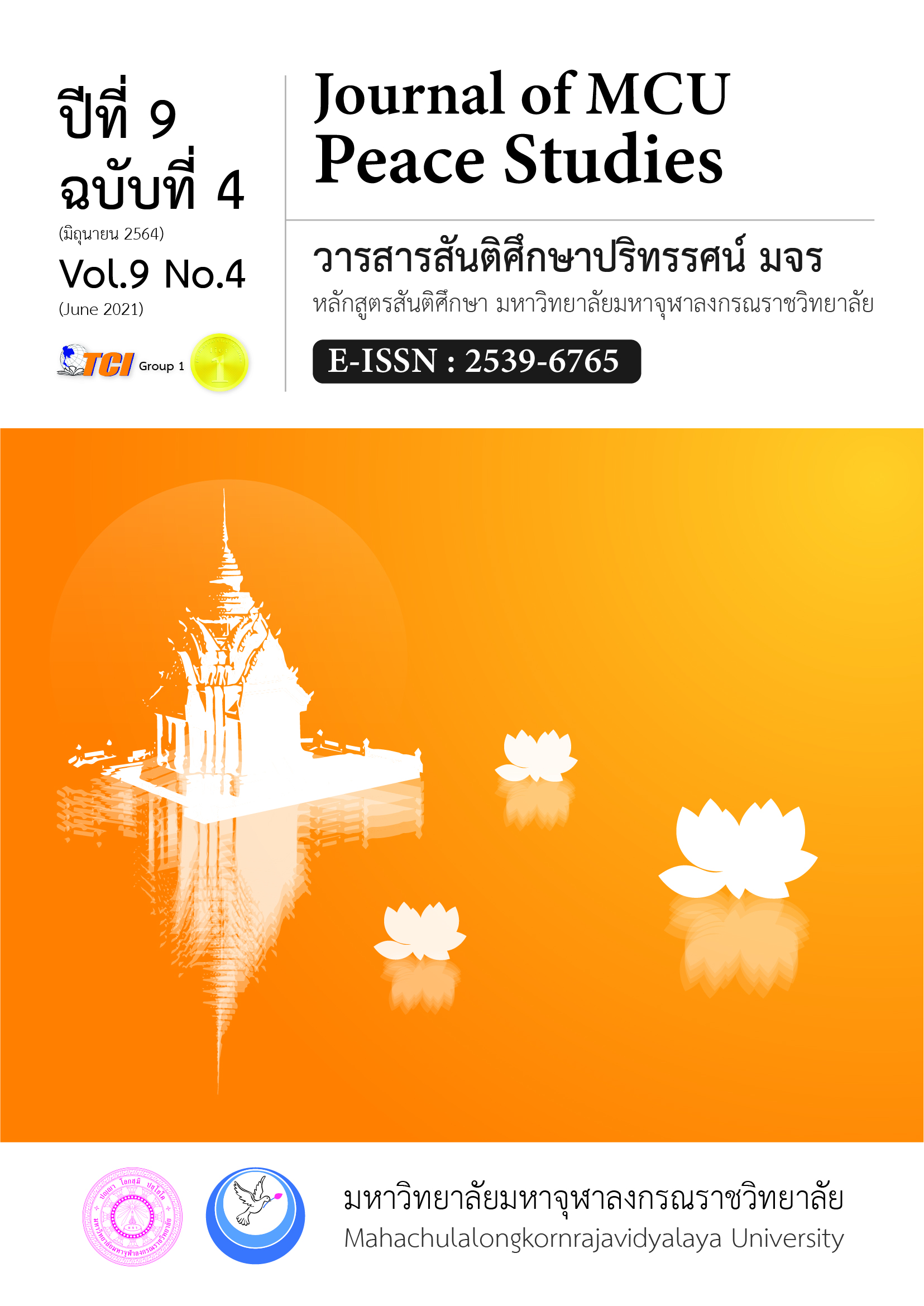พัฒนารูปแบบการเรียนการสอนตามแนวคิดทางพระพุทธศาสนาเพื่อส่งเสริมความสามารถในการแก้ปัญหา สำหรับนักเรียนระดับมัธยมศึกษาตอนปลาย
Main Article Content
บทคัดย่อ
บทความการวิจัยนี้มี วัตถุประสงค์เพื่อ 1) พัฒนารูปแบบการเรียนการสอนตามแนวคิดทางพระพุทธศาสนาเพื่อส่งเสริมความสามารถในการแก้ปัญหา สำหรับนักเรียนระดับมัธยมศึกษาตอนปลาย และ 2) ศึกษาประสิทธิผลของรูปแบบการเรียนการสอนตามแนวคิดทางพระพุทธศาสนาเพื่อส่งเสริมความสามารถในการแก้ปัญหา กลุ่มตัวอย่างที่ใช้ คือ นักเรียนมัธยมศึกษาชั้นปีที่ 6 โรงเรียนทุ่งใหญ่วิทยาคม ปีการศึกษา 2562 ภาคการศึกษาที่ 2 1 ห้องเรียน จำนวน 36 คน เครื่องมือที่ใช้ คือ 1) แผนการจัดการเรียนรู้ 2) แบบทดสอบวัดความสามารถในการแก้ปัญหา 3) แบบทดสอบวัดผลสัมฤทธิ์ 4) แบบประเมินพฤติกรรมทำงานกลุ่ม และ 5) แบบสอบถามความพึงพอใจ สถิติที่ใช้วิเคราะห์ข้อมูล ได้แก่ ค่าร้อยละ ค่าเฉลี่ย ส่วนเบี่ยงเบนมาตรฐาน และทดสอบค่าที ผลการศึกษาวิจัยพบว่า 1. รูปแบบการเรียนการสอนตามแนวคิดทางพระพุทธศาสนาเพื่อส่งเสริมความสามารถในการแก้ปัญหา มี 4 องค์ประกอบ 1) หลักการสำคัญของรูปแบบ 2) วัตถุประสงค์ของรูปแบบ 3) ขั้นตอนจัดกิจกรรม มี 4 ขั้นประกอบด้วย (1) สร้างกัลยาณมิตร (2) นำหลักพุทธธรรมมาแก้ปัญหา โดยใช้หลัก RPUT ซึ่ง R คือคิดถูกวิธี (Right Thinking) P คือคิดเป็นขั้นตอน (Process Thinking) U คือคิดเป็นประโยชน์ (Useful Thinking) T คือ การคิด (Thinking) (3) นำเสนอและสะท้อนความคิด (4) สรุปแนวคิดที่ได้ และ 4) วัดและประเมินผล 2. ประสิทธิผลของรูปแบบที่พัฒนาขึ้น พบว่า 1) ความสามารถในการแก้ปัญหา หลังเรียนสูงกว่าเกณฑ์ร้อยละ 80 มีนัยสำคัญทางสถิติที่ระดับ .05 2) ผลสัมฤทธิ์หลังเรียนสูงกว่าก่อนเรียนมีนัยสำคัญทางสถิติที่ระดับ .05 3) พฤติกรรมกลุ่มในภาพรวมและรายกลุ่มอยู่ในระดับดีมาก (x ̅ = 3.68, S.D. = 0.48) และ 4) ความพึงพอใจภาพรวมอยู่ในระดับมาก (x ̅= 4.24, S.D.= 0.63)
Article Details
ทัศนะและความคิดเห็นที่ปรากฏในบทความในวารสาร ถือเป็นความรับผิดชอบของผู้เขียนบทความนั้น และไม่ถือเป็นทัศนะและความรับผิดชอบของกองบรรณาธิการ ยินยอมว่าบทความเป็นลิขสิทธิ์ของวารสาร
เอกสารอ้างอิง
Amornvit, S. (1980). The Instruction on build faith and Yonisomanasikara. Bangkok: Triranasara.
Bunpasoot, M. (2010). The Development of Problem Solving Abilities of Eight Grade Students Taught by Problem Based Learning Approach. (Master’s Thesis). Gradate School: Silapakorn University. Nakhon Pathom.
Bloom, & Benjamin S. et al. (1956). Taxonomy of Educational Objectives Handbook 1: Cognitive Domain. (17th Ed.) New York: David Mackay.
Chailert, S. (2010). Construction of the environment problem-solving test of Muthayomsuksa 3 students in Bangkok. (Master’s Thesis). Graduate School. Srinakharinwirot University. Bangkok.
Joragat, S. (2012). The Development of Learning Activities Through Yonisomanasikara to Develop Critical Thinking Skills and Enhance Learning Achievment of Mattayomsuksa 4 Students; the Demonstration School Khon Kaen University. (Master’s Thesis). Graduate School: Khon Kaen University. Khon Kaen.
Joyce, B., & Weil, M. (1996). Model of teaching. (8thed.) Boston: Allyn and Baco.
Khammanee, T. (2013). Teaching science: Knowledge for effective learning process Management. (17th ed.) Bangkok: Chulalongkorn UniversityPress.
Karnjanapokin, K. (2020). Developing the Research Issues by Integrating Based on the Four Noble Truths. Asia Pacific Journal of Religions and Cultures, 2(1), 47-56.
Kraesang, T. (2015). The effect of a learner development program based on Yonisomanasikara approach on the media literacy of mathayomsuksa 3 students, Horwang school, Bangkok metropolitan. Journal of Graduate Studies Valaya Alongkron Rajabhat University, 9(3), 109-121.
Laoreindii, V. (2010). Supervision of Instruction: Supervision of Instruction. (7th ed.) Nakhonpathom: Silpakorn University Press.
Mc Namara, C. (1999). Basic guidelines to problem solving and decision making. Retrieved November 18, 2018, from http://www.authenticityconsultingcom.
Phra Brahmagunabhorn. (Phrayut Payutto). (2016). Buddha-Dharma Computer Data. (8th ed.) Bangkok: Mahachulalongkornrajavidyalaya University.
Phra Hongthong Katadhummo. (Chareeporn). (2014). Student’ Satisfaction with Buddhist monks as religious teachers from Mahamakut Buddhist university’s Roi Et campus. Academic Journal of Mahamakut Buddhist University Roi Et Campus, 4(1), 265-276.
Phra Manop yanadhammo. (Satayarak). (2016).The Satisfaction of Students Towards Eucational Management to Buddhism Subject of Moralityteaching Monks in Khlung District, Chanthaburi Province. (Master’s Thesis). Graduate School: Mahachulalongkornrajavidyalaya University. Ayuthaya.
Phra Paisal Visalo. (2002). Way of Thai, Civil Society and Community Culture. Bangkok: Srinakharinwirot University.
Phra Phithak Ariayaputto. (Boonthong). (2017). The Yonisomanasikara Approch of Buddhist Subject for Secondary School Titled Wat Maechoei, Uttaradit Province. (Master’s Thesis). Graduate School: Mahachulalongkornrajavidyalaya University. Ayuthaya.
Phramaha Samart Thanissaro. (2018). Satisfaction of students towards the teaching and learning activities of the monk teaches who taught morality in the Buddhist schools, Taveewatana District, Bangkok, Academic year 2560. Journal Faculty of Education Mahamakut Buddhist University, 6(2), 174-189.
Phramaha Surasak Mungchunklang. (2015). The study of learning outcomes advantagesdisadvantages and solution thinking on dharmas of buddhism for mathayomsuksa 1 students taught by yonisomanasikara thinking method. (Master’s Thesis). Graduate School: Silpakorn University. Nakhon Pathom.
Phuangphae, P. (2014). The development of an instructional model to enhance social students learning activities design competency for pre-service teachers. (Doctoral Dissertation). Graduate School: Silpakorn University. Nakhon Pathom.
Sinthapanon, S. et al. (2011). Teaching method based on Educational Reformation for developing quality of life for youths. Bangkok: 9119 Techniques Printing Ltd.
Tonseenon, K. (2018). Learning Management According to Yonisomanasikara in Buddhist Subject for Subject for Student Grade VIII of Horwang Patumthani School, Suanprikthai Sub-District, Mueng District, Patumthani Province. (Master’s Thesis). Graduate School: Mahachulalongkornrajavidyalaya University. Ayuthaya.


